The journey of motherhood is filled with countless changes, not just in your lifestyle but also in your body. Among these changes, one of the most common yet least discussed is post-pregnancy hair fall. After the joy of welcoming a new life, many new mothers face the distressing reality of hair thinning and increased hair shedding. This phenomenon, while alarming, is a natural response to the hormonal shifts that occur after giving birth.
During pregnancy, elevated levels of estrogen prolong the growing phase of the hair, leading to less shedding and often a fuller head of hair. However, after childbirth, as hormone levels normalize, the hair compensates by entering the shedding phase, resulting in noticeable hair loss. This process is not permanent but can affect one’s self-esteem and emotional well-being.
Understanding that this is a temporary phase can offer some solace. The majority of women see their hair return to its pre-pregnancy thickness within six to twelve months after giving birth. However, the journey back to normalcy can feel long, and it’s natural to seek ways to minimize hair fall and encourage healthy hair growth during this period.
The good news is that there are several home remedies and lifestyle adjustments that can nurture your scalp and hair, potentially speeding up the recovery process. It’s important to approach this period patiently and carefully, prioritizing gentle treatments over harsh chemicals or rigorous hair care routines.
Recommended: Does Family Planning Affect Future Pregnancy?
In the following sections, we will delve into why post-pregnancy hair fall happens, outline nutritional foundations essential for healthy hair, introduce natural remedies and home treatments to mitigate hair fall, suggest lifestyle adjustments to promote hair regrowth, and discuss when it might be necessary to seek professional help. Through understanding and a gentle approach, it’s possible to nurture your hair back to health, reflecting the beauty and strength of motherhood.
Understanding Post-Pregnancy Hair Fall
The experience of hair fall after pregnancy, medically known as telogen effluvium, is a phenomenon many new mothers encounter, yet it often catches them off guard. Recognizing the reasons behind this condition and knowing when it typically resolves can provide reassurance and a sense of normalcy during this stressful time. Here’s a deeper look into the factors contributing to post-pregnancy hair fall, its usual timeline, and guidance on when medical advice might be necessary.
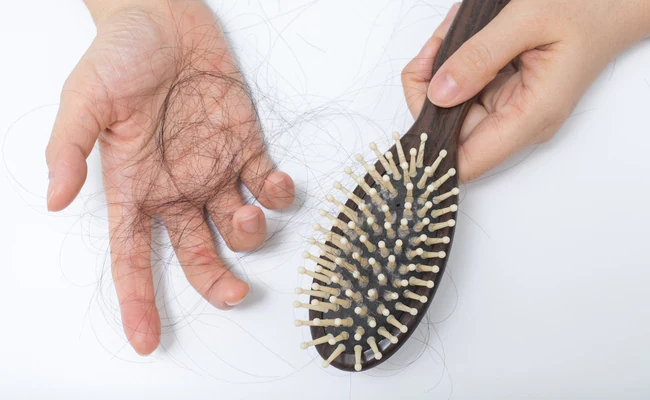
The Role of Pregnancy Hormones
- Estrogen and Progesterone: During pregnancy, levels of estrogen and progesterone are high, supporting not only the health and growth of your baby but also affecting your hair. These hormones keep hair in a prolonged growth phase, leading to thicker, more vibrant hair for many women. However, this is a temporary phase.
- Postpartum Hormonal Shift: After childbirth, these hormone levels quickly drop back to their pre-pregnancy levels. This sudden change shocks the hair follicles, pushing more hair than usual into the resting (telogen) phase, which is followed by shedding (effluvium).
- Other Hormonal Factors: Additionally, changes in thyroid hormones after childbirth can also contribute to hair fall. While this is less common, it’s an important factor to consider, especially if hair loss is severe or accompanied by other symptoms.
Typical Timeline for Hair Fall After Pregnancy
When It Starts: Most new mothers start noticing hair fall around three months after giving birth. This timing corresponds with the lifecycle of hair growth and the delay in response to hormonal changes postpartum.
Duration: While the intensity of hair shedding can be alarming, it’s usually temporary. Most women see their hair growth begin to normalize around six to twelve months after delivery. By their child’s first birthday, many mothers report their hair feels closer to its pre-pregnancy state.
Variability: It’s important to note that the extent and duration of post-pregnancy hair fall can vary widely from one individual to another. Factors such as overall health, nutrition, stress levels, and genetics all play a role in this variation.
Recommended: How To Get Rid Of Smelly Discharge During Pregnancy
Understanding these aspects of post-pregnancy hair fall can be the first step toward managing this condition effectively. By recognizing the hormonal underpinnings and typical timeline, new mothers can approach this phase with informed patience and seek professional advice when necessary, ensuring a smoother transition back to their pre-pregnancy hair health.
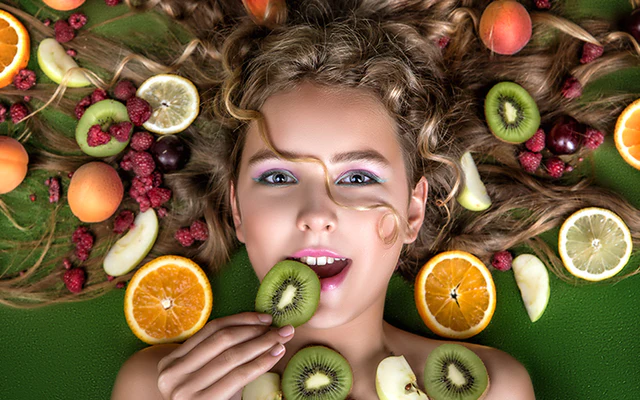
Nutritional Foundations for Healthy Hair
The postpartum period demands a lot from the body, including nutrients to support recovery and breastfeeding, if applicable. Proper nutrition is not only vital for your overall health but also plays a crucial role in the health and recovery of your hair after pregnancy. Understanding and incorporating key nutrients into your diet can significantly influence your hair’s health, potentially reducing hair fall and encouraging regrowth.
Here’s a closer look at essential nutritional components for healthy hair and how to include them in your diet.
Importance of a Balanced Diet
The foundation of healthy hair lies in a well-rounded diet that supplies all the necessary nutrients your body needs. Just like any other part of your body, the hair follicles require a variety of vitamins, minerals, and proteins to function optimally. Ensuring your diet includes a balance of fruits, vegetables, proteins, fats, and carbohydrates is crucial for hair health.
- Iron-rich Foods: Iron is critical for hair growth and strength. Low iron levels can lead to hair fall, making it essential for postpartum women, especially those who experienced significant blood loss during childbirth. Include iron-rich foods like spinach, lentils, fortified cereals, and red meat in your diet to help maintain healthy iron levels.
- Protein Sources: Hair is primarily made of protein, so adequate protein intake is necessary for hair growth. Include a variety of protein sources such as eggs, dairy products, fish, lean meats, and plant-based proteins like beans and lentils to support hair health.
- Vitamins and Minerals: Vitamins C, D, and E, along with B vitamins (especially biotin), play significant roles in hair health. Vitamin C aids in iron absorption and collagen production, while Vitamin D is linked to hair production. B vitamins, particularly biotin, are known for their role in hair health. Zinc is another important mineral for hair growth and repair. Foods like citrus fruits, berries, nuts, seeds, and green leafy vegetables can provide these essential nutrients.
Recommended: Why Do Tampons Leak When Not Full?
Hydration and Its Impact on Hair Health
Staying hydrated is fundamental for maintaining the health of your hair. Water makes up a significant portion of hair strands and helps maintain the integrity of the hair cells. Dehydration can lead to dry, brittle hair that is more prone to breaking. Aim to drink at least eight 8-ounce glasses of water a day, and remember that breastfeeding women may require more to stay adequately hydrated.
Supplements: Are They Necessary?
While a balanced diet is the best way to get the nutrients you need, some individuals might find it challenging to meet their nutritional requirements through food alone, especially during the demanding postpartum period. In such cases, supplements can help fill the gaps.
- Prenatal and Postnatal Vitamins: Continuing to take your prenatal vitamins after childbirth, especially if you’re breastfeeding, can provide a good nutrient base. Some healthcare providers may also recommend specific postnatal vitamins tailored to the needs of new mothers.
- Targeted Supplements: For specific deficiencies (like iron or Vitamin D), targeted supplements may be necessary. However, it’s crucial to consult with a healthcare provider before starting any supplement, especially during breastfeeding, to ensure it’s safe and to determine the correct dosage.
Recommended: Can You Drink Alcohol After Taking Abortion Pill?
Incorporating these nutritional foundations into your daily routine can significantly impact your hair’s health and your overall recovery after pregnancy. A balanced diet, rich in essential nutrients, not only supports your body’s healing process but also sets the stage for healthier, stronger hair growth during the postpartum period.
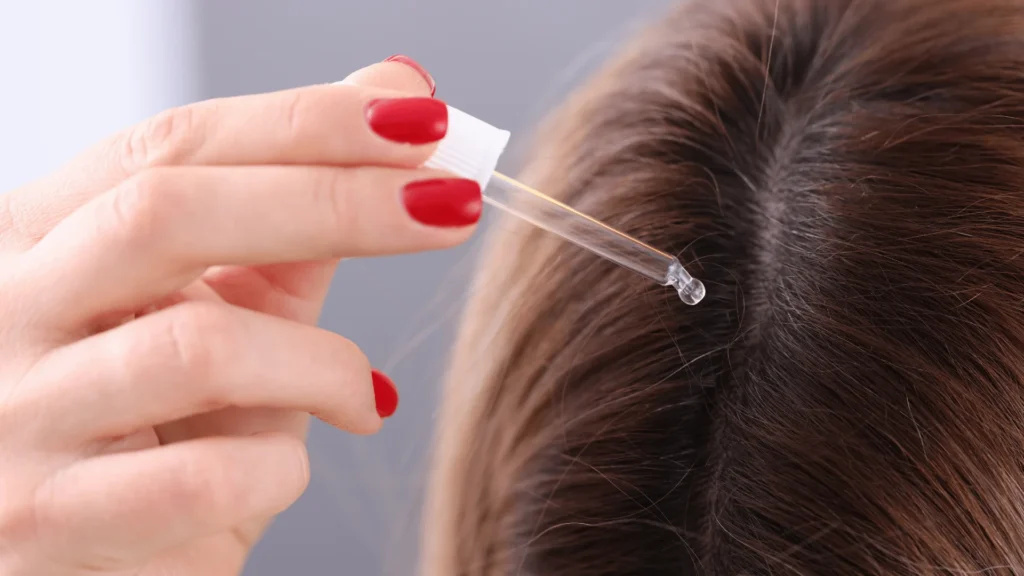
Natural Remedies and Home Treatments
The postpartum period can be challenging, and dealing with hair fall adds another layer of stress for new mothers. Fortunately, there are several natural remedies and home treatments that can help manage hair fall and promote healthy hair growth. These methods focus on nurturing the scalp and hair gently, without the need for harsh chemicals or expensive treatments. Let’s explore some effective natural remedies and how to incorporate them into your hair care routine.
1. Scalp Care and Gentle Handling
- Avoid Tight Hairstyles: Tight hairstyles can pull on the hair roots and potentially worsen hair fall. Opt for loose hairstyles to minimize stress on your hair follicles.
- Use a Soft Hairbrush: A soft-bristled brush can help detangle your hair gently, reducing breakage. Start from the ends and work your way up to avoid pulling on knots.
- Lower Heat Styling: High temperatures can weaken your hair shafts, leading to more breakage. If possible, let your hair air-dry and minimize the use of heat-styling tools.
2. Natural Oils for Scalp Massage
- Coconut Oil: Known for its penetrating properties, coconut oil can moisturize the scalp and hair, reducing dryness and making hair less prone to breakage. Massaging your scalp with warm coconut oil before washing can also improve blood circulation, supporting healthy hair growth.
- Castor Oil: Rich in ricinoleic acid, castor oil can promote healthier and faster hair growth. Its thick consistency also helps in moisturizing dry scalp and hair. Mix it with a lighter oil like coconut or almond oil for easier application.
- Almond Oil: Packed with vitamins D and E, almond oil is excellent for nourishing the scalp and hair. Its emollient properties help in smoothing hair cuticles and preventing shedding.
Recommended: Does Sex Affect Periods?
3. Homemade Hair Masks
- Egg and Yogurt Mask: Eggs are rich in protein and biotin, both essential for hair health, while yogurt has lactic acid that cleanses the scalp. Mix one egg with two tablespoons of yogurt and apply the mixture to your scalp and hair. Leave it on for 20-30 minutes before washing off with mild shampoo.
- Aloe Vera and Honey Mask: Aloe vera soothes the scalp and conditions hair, reducing dandruff and promoting hair growth. Honey is a humectant that moisturizes hair. Combine equal parts of aloe vera gel and honey, apply to your hair and scalp, and leave it for about 30 minutes before rinsing.
- Onion Juice Remedy: Although the smell might be off-putting for some, onion juice has been touted for its ability to treat hair fall and encourage hair growth, thanks to its high sulfur content. Apply fresh onion juice to the scalp, leave it on for 15-20 minutes, then wash off with a mild shampoo.
4. Herbal Rinses
- Green Tea Rinse: Rich in antioxidants, green tea can stimulate hair growth and prevent hair loss. Brew a strong cup of green tea, let it cool, and use it as a final rinse after your regular hair wash.
- Fenugreek Seed Rinse: Fenugreek seeds are known for their hair-nourishing properties and ability to promote hair growth. Soak the seeds overnight, grind them into a paste, and apply to the scalp. Leave it on for about 30 minutes before washing off. Alternatively, the water used for soaking can be used as a hair rinse.
Recommended: Top 6 Signs Of Poor Egg Quality You Should Know
Incorporating these natural remedies and home treatments into your postpartum care routine can offer a gentle yet effective approach to managing hair fall. While these methods can provide relief and promote healthier hair growth, remember that patience and consistency are key. Allow your body and hair the time they need to recover, and consult with a healthcare professional if you have concerns about your hair fall.

Lifestyle Adjustments for Hair Regrowth
Hair health is deeply intertwined with your overall well-being, making lifestyle adjustments an integral part of addressing post-pregnancy hair fall and promoting regrowth. Stress management, sleep, physical activity, and avoiding certain hair care practices can all have a significant impact on the health of your hair. Here’s how you can modify your lifestyle to support hair regrowth during the postpartum period.
1. Stress Reduction
The postpartum period can be particularly stressful, and stress is known to exacerbate hair fall. Finding effective ways to manage stress can not only improve your overall well-being but also benefit your hair.
Practices such as mindfulness and meditation can help reduce stress levels. Even a few minutes a day can make a difference. Don’t hesitate to seek support from family, friends, or professional counselors. Sharing responsibilities and expressing your feelings can significantly reduce stress.
2. Prioritize Sleep
Quality sleep is crucial for the body’s repair processes, including those affecting hair growth and health. Ensure your bedroom is quiet, dark, and comfortable. Establishing a relaxing bedtime routine can also help signal to your body that it’s time to wind down.
With a newborn, the “sleep when the baby sleeps” advice can be invaluable. Short naps can help reduce sleep debt and support your body’s healing process.
3. Physical Activity
Regular physical activity can improve circulation, reduce stress, and enhance overall health, indirectly benefiting hair growth. Start with gentle exercises such as walking or postpartum yoga. Always consult with your healthcare provider before beginning any postpartum exercise routine.
Simple changes like taking the stairs instead of the elevator or going for a walk with your baby in a stroller can increase your activity level without overwhelming your schedule.
4. Hair Care Practices
How you treat your hair on a daily basis can influence its health and the rate of regrowth.
- Minimize Chemical Treatments: Chemical treatments such as coloring, perming, or straightening can further stress and damage hair. Consider delaying these treatments until your hair regains its strength.
- Avoid Over-Washing: Washing hair too frequently can strip it of natural oils, leading to dryness and breakage. Depending on your hair type, reducing washes to two or three times a week can help maintain its natural moisture balance.
- Choose Hair Care Products Wisely: Opt for mild, sulfate-free shampoos and conditioners. Products designed for thinning hair can also be beneficial as they often contain ingredients that support hair health and thickness.
5. Avoid Smoking and Limit Alcohol Consumption
Both smoking and excessive alcohol consumption can impede the body’s ability to absorb nutrients essential for hair health. Quitting smoking and moderating alcohol intake can have numerous health benefits, including improved hair growth.
Recommended: Can You Be a Surrogate With Your Tubes Removed?
By integrating these lifestyle adjustments, you can create a supportive environment for hair regrowth. Remember, the postpartum period is a time of adjustment and recovery. Be patient with your body and your hair as they heal and adapt to the changes post-pregnancy.
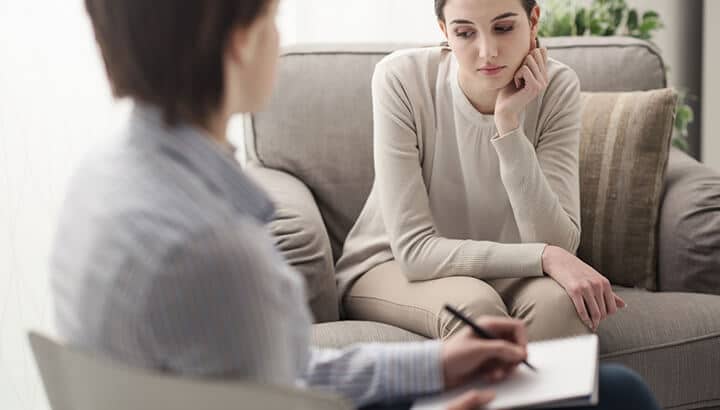
When to Seek Professional Help
While experiencing hair fall after pregnancy is common and usually temporary, there are instances when it might indicate a more serious underlying issue or require professional intervention to manage effectively. Understanding when to seek help can ensure that any potential problems are addressed early, providing peace of mind and potentially more effective treatments.
Here are scenarios and signs that suggest it’s time to consult a healthcare professional or a trichologist (a specialist in scalp and hair health).
1. Excessive Hair Loss
While it’s normal to shed more hair than usual in the postpartum period, there should be limits to this loss. If you’re losing large clumps of hair or notice significant thinning that creates visible patches on your scalp, it’s time to seek advice.
- Unusual Patterns of Hair Loss: Hair loss that doesn’t follow the typical pattern of postpartum shedding, such as receding hairline or bald patches, warrants a professional evaluation.
- Persistent Shedding: Postpartum hair loss typically peaks around 4 months after delivery and gradually improves. If your hair continues to fall out excessively beyond the 6 to 12-month range, professional insight is necessary.
Recommended: Top 5 Foods To Avoid While Taking Letrozole For Fertility
2. Scalp Issues
Changes in your scalp’s health can also signal the need for professional help. Conditions like persistent dandruff, scalp pain, itching, or inflammation can be signs of dermatological conditions that may contribute to hair loss.
- Unresponsive to Over-the-counter Treatments: If you’ve tried home remedies or over-the-counter treatments for scalp issues without improvement, a healthcare provider can offer prescription solutions or alternative treatments.
- Visible Scalp Changes: Noticeable changes in the appearance of your scalp, such as redness, scaling, or unusual patterns of hair loss, should be assessed by a professional.
3. Underlying Health Conditions
Sometimes, hair loss can be a symptom of an underlying health issue that requires treatment.
- Thyroid Disorders: Both hyperthyroidism and hypothyroidism can cause hair loss. If you’re experiencing other symptoms of thyroid issues, such as changes in weight, mood, or energy levels, it’s important to get tested.
- Nutritional Deficiencies: Deficiencies in iron, vitamins, and other nutrients can lead to hair loss. A healthcare provider can order tests to identify deficiencies and recommend dietary changes or supplements.
- Hormonal Imbalances: Besides thyroid issues, other hormonal imbalances can impact hair health. Conditions like polycystic ovary syndrome (PCOS) may lead to hair thinning or loss.
4. Emotional and Psychological Impact
The emotional and psychological impact of hair loss should not be underestimated. If your hair loss is affecting your self-esteem, mental health, or daily life, seeking support from a healthcare professional is crucial. They can provide or recommend counseling services, support groups, or other resources to help you cope.
How to Prepare for Your Appointment
When you decide to seek professional help, preparing for your appointment can ensure you get the most out of your visit.
- Document Your Hair Loss: Take note of when you first noticed the hair loss, any patterns or changes, and any other symptoms you’re experiencing.
- List All Medications and Supplements: Include everything you’re taking, as some products might contribute to hair loss.
- Be Ready to Discuss Your Diet and Lifestyle: Information about your diet, exercise, stress levels, and alcohol or tobacco use can help the professional assess your situation comprehensively.
Recommended: How Soon After Tubal Reversal Can I Try To Conceive?
Remember, seeking professional help is a proactive step towards understanding and managing your postpartum hair loss. A healthcare provider can offer personalized advice, treatment options, and reassurance, helping you navigate this aspect of post-pregnancy recovery with confidence.
FAQs
How long does post-pregnancy hair fall last?
Post-pregnancy hair fall typically begins around 3 months after childbirth and can last up to 6-12 months. For most women, hair volume and growth patterns return to pre-pregnancy conditions after this period.
Can dietary changes help reduce hair fall after pregnancy?
Yes, dietary changes can significantly impact hair health. Increasing the intake of proteins, vitamins (especially B vitamins, vitamin D, and vitamin E), minerals (such as iron and zinc), and omega-3 fatty acids can support hair growth and reduce hair fall.
Is it safe to use hair care products during the post-pregnancy period?
While it’s generally safe to use hair care products, it’s advisable to choose those that are mild, sulfate-free, and designed for sensitive scalps or thinning hair. Always patch-test new products to avoid allergic reactions.
How can I prevent hair breakage while dealing with post-pregnancy hair fall?
To prevent breakage, avoid tight hairstyles, minimize heat styling, use a wide-tooth comb for detangling, and apply a leave-in conditioner or detangling spray to reduce friction.
Is it normal for hair texture or color to change after pregnancy?
Yes, it’s common for some women to notice changes in hair texture (e.g., from straight to curly) or hair color. These changes are due to hormonal shifts during pregnancy and usually stabilize over time.
Can breastfeeding impact hair fall after pregnancy?
There’s no direct link between breastfeeding and hair fall. Hair fall post-pregnancy is primarily related to hormonal adjustments. Ensuring a balanced diet while breastfeeding can support both your overall health and hair health.
Conclusion
Experiencing hair fall after pregnancy is a common issue that many new mothers face due to the complex interplay of hormonal changes, nutritional demands, and lifestyle adjustments. While it can be distressing, understanding that this phase is typically temporary provides some comfort.
By incorporating natural remedies, making informed lifestyle adjustments, and knowing when to seek professional help, you can effectively manage and mitigate hair loss during this period. Patience, self-care, and a proactive approach toward hair health can help you navigate this challenge and support your overall well-being as you adjust to life with your new baby.
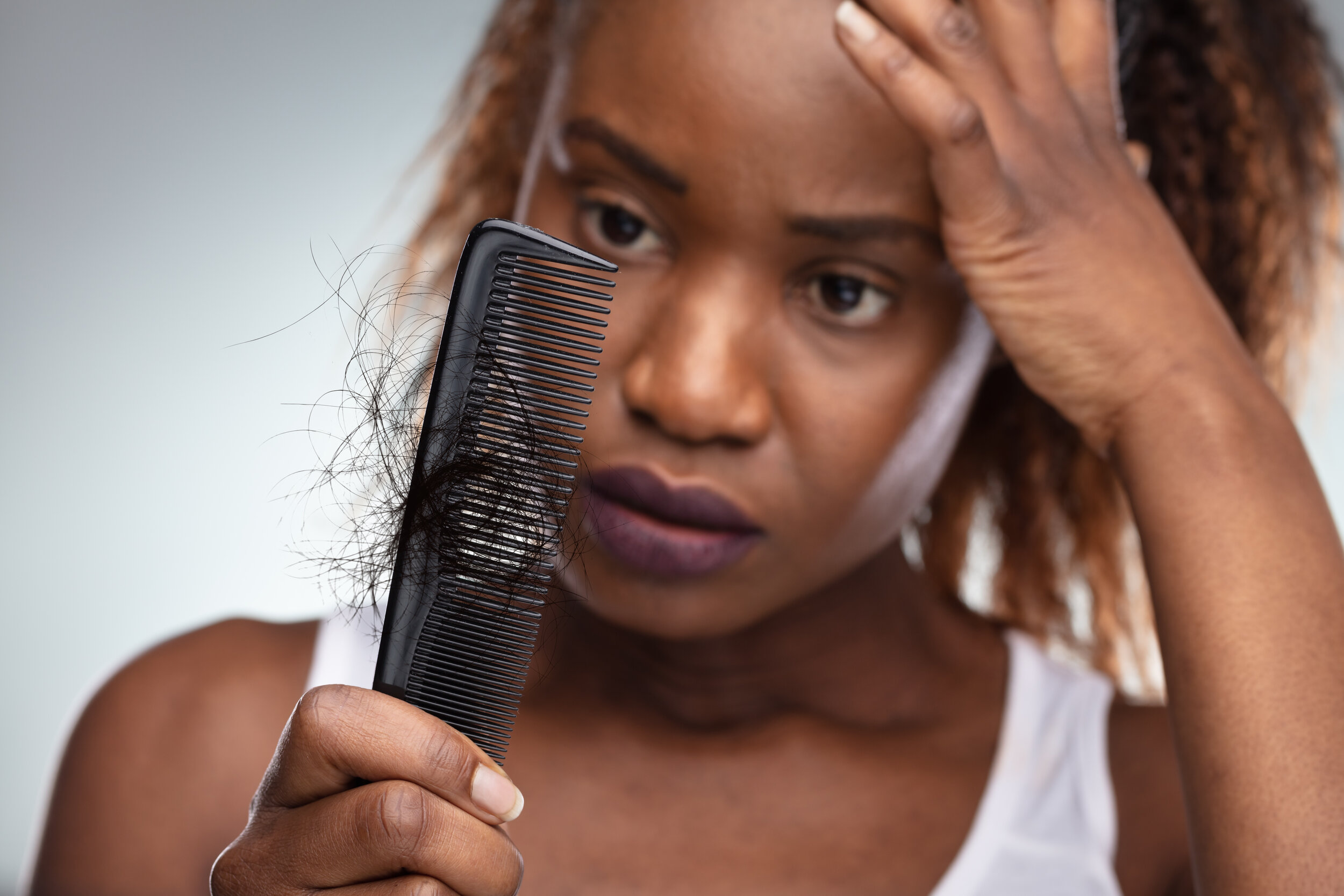
Somebody necessarily assist to make severely articles I’d state.
This is the first time I frequented your website page and to this point?
I amazed with the research you made to create this actual post extraordinary.
Fantastic process!
magnificent issues altogether, you simply won a new reader.
What would you suggest about your post that you made some days ago?
Any positive?
I am really loving the theme/design of your site. Do you ever
run into any browser compatibility issues? A few of my blog readers
have complained about my website not working
correctly in Explorer but looks great in Opera. Do you
have any tips to help fix this issue?